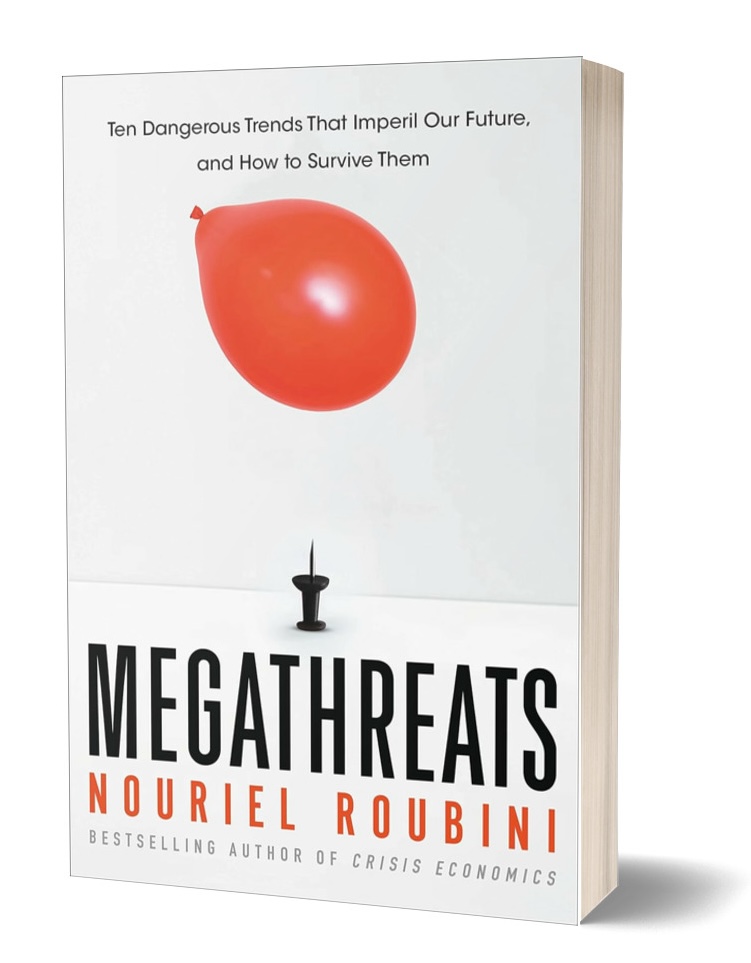MegaThreats: Ten Dangerous Trends That Imperil Our Future, And How to Survive Them by Nouriel Roubini
Summary and takeaways from the book.
Keywords:
Informed
Better life
Wealth Transfer
Feb 8, 2024
"
This book explores the ten key megathreats bearing down on us.
A single threat sounds distressing. Ten megathreats happening at once is far, far worse".

ISBN: 978-0316284059
Published: October 18, 2022
Pages: 320
Available on:
amazon
Nouriel Roubini is Professor Emeritus (2021-present), Professor of Economics (1995-2021), Stern School of Business, New York University.
"
From 1998 to 2000, he served as the senior economist for international affairs on the White House Council of Economic Advisors and then the senior advisor to the undersecretary for international affairs at the U.S. Treasury Department".
"
This book explores the ten key megathreats bearing down on us".
"
A single threat sounds distressing. Ten megathreats happening at once is far, far worse".
"
We totter now on a precipice, the ground shaking beneath us. Yet most of us still imagine that the future will resemble the past. That's a whopping mistake.
New warning signs look clear and compelling. Economic, financial, technological, trade, political, geopolitical, health, and environmental risks have morphed into something much bigger.
Welcome to the era of megathreats: they will alter the world we thought we knew".
"Economic and geopolitical certainties we once took for granted—from job security, to a sustainable and healthy planet, where most infectious diseases were conquered, and to peace among rival great powers—are disappearing".
Blaming COVID
The author says "
The pace of global debt accumulation has been unprecedented since 2016, the Institute of International Finance warned in a November 2020 Weekly Insight report entitled 'More Debt, More Trouble'. In other words, this crisis was already coming. The pandemic only accelerated it".
COVID did not create these problems. Our debt problems and bloated government were blamed on COVID.
This is why it was also necessary for the government to blow COVID threat out of proportion and exaggerate it.
Lesson here is to expect government to blame cyberthreats, foreigners, mass migration, melting ice, wars, foreign governments, solar flare, asteroids, and maybe even aliens for the megathreats ahead.
The Megathreats
Some of the Megathreats are:
The Mother of All Debt Crises: "
The Mother of All Debt Crises may take place sometime during the current or next decade"(2022-2032).
Private and Public Failures: Highly leveraged households, zombie companies, and bloated government.
The Demographic Time Bomb: leading to mass migration.
Staglfation
AI
De-globalization
New Cold War
Climate Crisis
Blind spots
Public and even trained professionals have blind spots where they can completely miss the obvious.
"
It’s a classic bias in human thinking: most of us never want to imagine the worst. We are optimists by nature".
"
Consensus groupthink often rules among the world’s elites".
People also rely on economic and mathematical models in our science driven world to predict trends. These models can be flawed, or skewed towards making things look good than they are.
The author talks of his experience in 2006 at World Economic Forum in Davos when he predicted the 2008 Financial Crisis: "
If everyone in the Davos set believes something will happen—good or bad, as it may be—they are highly likely to be wrong".
"
Many of the megathreats in this book arose from actions that looked at one time like solutions to particular problems: misguided financial deregulation and unconventional macroeconomic policies, carbon-emitting industrialization, the offshoring of manufacturing jobs, the development of artificial intelligence, and empowering China to compete globally, among others".
No easy solutions
"
Start with the observation that megathreats are structural. Income and wealth inequality, massive private and public debts, financial instability, climate change, global pandemics, artificial intelligence, and geopolitical rivalries have deep roots in worldwide systems and cultures. We cannot attack their causes without risking unintended consequences".
As an example: "
instituting a significantly progressive tax policy in one country to tackle inequality could lead the wealthiest citizens to relocate to lower tax jurisdictions or depress capital spending".
"Even if solutions were fairly obvious, the tenacity required to achieve them is unprecedented.
Like a cancer that ravages bodies, megathreats will wreak havoc on the global infrastructure and current world order. Expect many dark days, my friends.".
"
Asteroids smash into the earth with spectacular effect. Megathreats, on the other hand, unfold while decision-makers watch and dither, arguing about their importance and their likelihood.".
Megathreats are slow moving without any spectacular event in time. So people adapt to them, and governments deny it.
* * *
"This bubble will burst.
The question is not if, it is when, and how much pain the coming dystopia will inflict. "
Just like governments did with COVID, governments will respond to crisis by shutting themselves into isolation to protect themselves from global events.
"
Autocrats who adopt it are ‘willing to pay the price of becoming a totally failed country, to see their country enter the category of failed states,’ accepting economic collapse, isolation, and mass poverty if that’s what it takes to stay in power".
"
unfortunately, the dystopian scenario looks much more likely".
"
The world is facing at least ten megathreats. Over the next couple of decades, they will lead to a titanic collision of economic, financial, technological, environmental, geopolitical, medical, and social forces".
"
Fasten your seatbelt. It’s going to be a bumpy ride through a very dark night".
Related articles
System Fail
Career Advice
External Links
